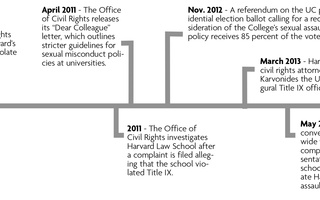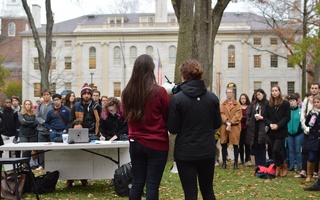{shortcode-89b31a256a13a9aeda552ecae577997cfbb0d81c}In the days before Harvard Law School announced embattled Supreme Court nominee Brett M. Kavanaugh will not teach in Cambridge this January, undergraduates eager to block his return to campus struck on a new strategy: file Title IX complaints against the conservative judge.
Over the past week, several students filed formal complaints alleging Kavanaugh’s presence in Cambridge would violate Harvard’s policy prohibiting sexual and gender-based harassment — though several Title IX experts said this strategy was unlikely to succeed.
Jacqueline L. Kellogg ’19 — who said she has filed a complaint against Kavanaugh with the University’s Office for Dispute Resolution — came up with the idea several days ago. She began urging fellow students to follow suit over the weekend, at one point sending an email to a group of students at the College and the Law School that offered specific instructions on how to bring a formal complaint to ODR.
By the time The Crimson reported late Monday that Kavanaugh had left his teaching position at the Law School, at least 48 students had signed an online petition certifying they had filed a Title IX complaint against the nominee. But at least one signatory said that not all of those who signed the petition had actually filed complaints as of Monday evening.
The flurry of complaints comes as Kavanaugh — a Yale Law School graduate who has long served as a D.C. circuit court judge — awaits a Senate confirmation vote delayed by a week-long FBI investigation into allegations that he sexually assaulted at least two women decades ago. Kavanaugh became a household name when President Donald Trump nominated him to fill a vacant seat on the Supreme Court in July.
At first, the judge’s confirmation seemed all but certain. But it didn’t last.
First, Christine Blasey Ford told the Washington Post that Kavanaugh had tried to rape her at a house party the two attended in suburban Maryland in the 1980s. Days later, Deborah Ramirez told the New Yorker that Kavanaugh had pushed his penis in her face at a party both attended while students at Yale.
Last Wednesday, Julie Swetnick said in a sworn affidavit that Kavanaugh was present while a group of teenage boys drugged and raped her at a D.C.-area party in 1982.
The cascade of accusations prompted some Law School students to protest Kavanaugh’s confirmation and to demand Harvard investigate the allegations against the nominee before allowing him to return to campus to teach a course on the Supreme Court in Jan. 2019. Kavanaugh has taught at the Law School since 2008.
Kellogg’s email to students included an explanation of ODR’s operating procedures and encouraged recipients to reference Harvard’s policies barring gender-based harassment. The University defines gender-based harassment as “verbal, nonverbal, graphic, or physical aggression, intimidation, or hostile conduct based on sex, sex-stereotyping, sexual orientation or gender identity.”
Kellogg and Julia B. Wiener ’19 — who also signed the petition and filed a complaint against Kavanaugh — both argued the nominee’s presence on campus would create a “hostile environment” as defined in Harvard guidelines related to sexual harassment.
Kellogg said she hopes students who have previously felt reluctant to file complaints with the University — whether related to Kavanaugh or to other experiences — will see that the formal process gives them “power” and “a right to our feeling of being safe.”
“I hope that, as students file these complaints and engage with this process of singling out accusers and harassers on campus, that it actually can be seen that this process is a little less formidable than the reputation of the process is on campus,” she said.
Kellogg and Wiener said they believe students who have suffered sexual assault or harassment would have been negatively affected had they encountered Kavanaugh around campus.
“If you had a meeting in Wasserstein, you don’t know if he’s going to be there,” Wiener said. “It would be pretty terrifying for any survivor or any person to walk into a building on campus and see someone who has been alleged of a very serious crime.”
William D. McCants, the director of ODR, declined to comment via a spokesperson. The University typically does not comment on the existence or status of Title IX investigations.
Some Harvard Law School professors were not sold on Kellogg and Wiener’s tactics.
Jeannie Suk Gersen, a professor at the Law School and a Title IX expert who has written extensively about Kavanaugh’s confirmation, said that — while she supports the students’ freedom to protest the nominee’s former teaching role at Harvard — the notion of filing Title IX complaints is “misplaced.”
“Such an abuse of process would undermine the legitimacy and credibility of complaints that the Title IX process is intended to deal with, as well as of the Title IX office to focus on its duties,” Suk Gersen wrote in an email. “It might be effective in drawing further attention to some students’ objection to Kavanaugh’s teaching appointment, but I don’t expect him to be found to have violated Harvard University’s Sexual & Gender-Based Harassment Policy based on the currently known public allegations against him.”
Janet Halley, another Law School professor with a background in Title IX law, also called the students’ strategy of filing formal complaints unlikely to succeed.
“I urge the students to divert their energy from this implausible claim that he’s going to create a sexually hostile environment by teaching at the Law School to the really grand issue of whether he’s fit to be in his current judgeship or promoted to the Supreme Court,” Halley said.
Had Kavanaugh not chosen to leave the Law School, administrators would have been forced to review students’ complaints under the school’s Title IX procedures. It is unclear what will become of the complaints now that the nominee has severed his ties to Harvard.
—Staff writer Shera S. Avi-Yonah can be reached at shera.avi-yonah@thecrimson.com. Follow her on Twitter @saviyonah
—Staff writer Jamie D. Halper can be reached at jamie.halper@thecrimson.com. Follow her on Twitter @jamiedhalper.
Read more in University News
Faust, Khurana, Smith To Testify in Admissions Trial
















